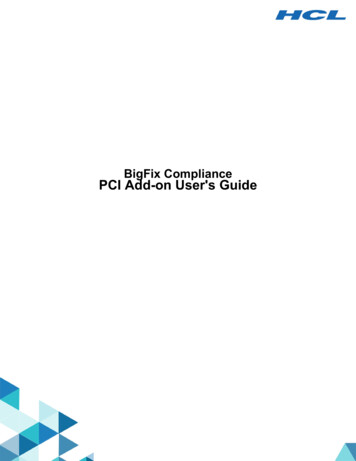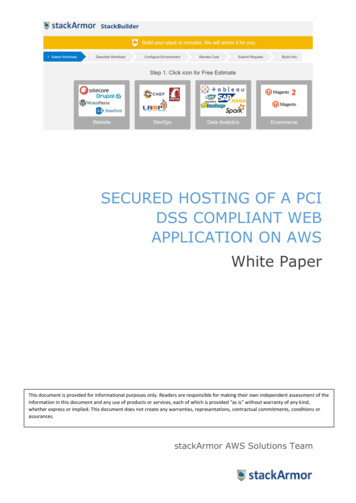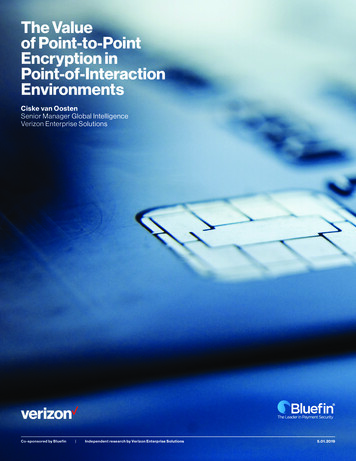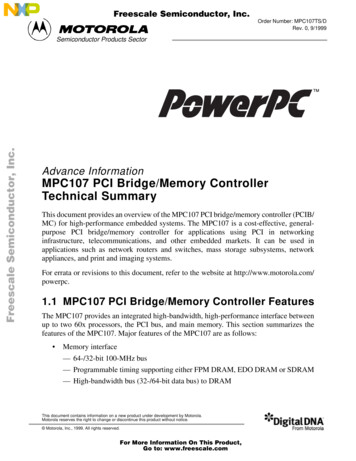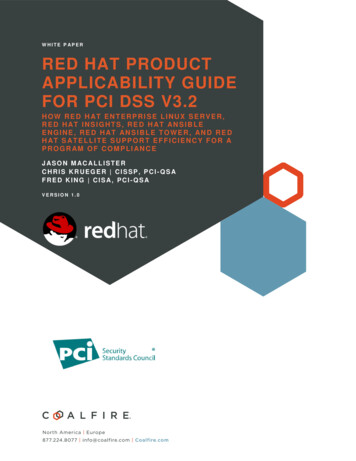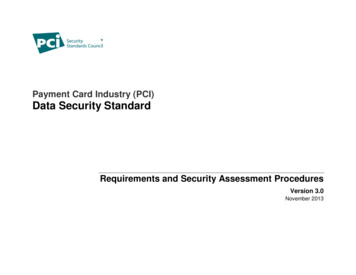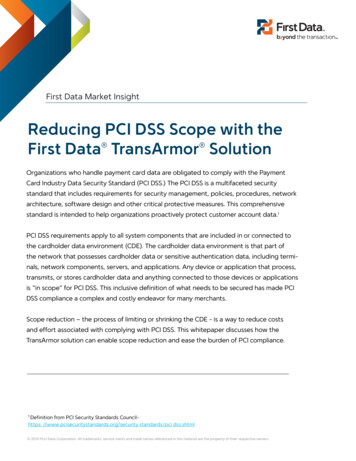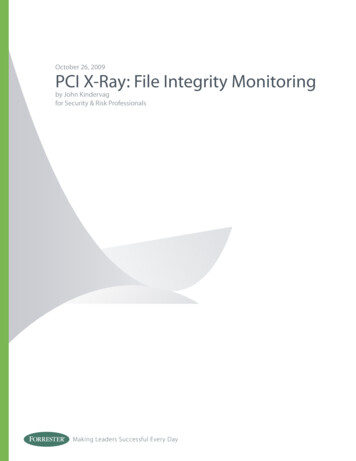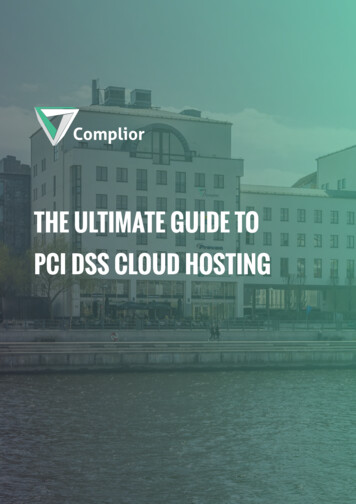
Transcription
CompliorTHE ULTIMATE GUIDE TOPCI DSS CLOUD HOSTING
CompliorThe Ultimate Guide to PCI DSS Cloud HostingINTROYou collect payment from your customers online and you know it’s your company’sresponsibility to keep that information secure, confidential and from getting hacked andreleased into the world of the Internet.It’s your reputation, your brand and your customer’s trust all on the line.So what exactly do you need to do for your business to both meet customer’s expectations,the guidelines and standards set out by governing bodies?Do you need to hire an expert in-house or is there a reliable service you can partner with tooutsource to comply?Below we outline the ultimate guide for all you need to know about the Payment CardIndustry Data Security Standard (otherwise referred to as PCI DSS) and options for yourbusiness.IN THIS GUIDE:SHOULD YOU OUTSOURCE?»» What exactly is PCI DSS?»» So what’s the solution?»» Outsourcing hosting to a PCI DSS certified hosting providerPCI DSS CLOUD HOSTING»» How does it work?»» What assets do you need from potential service providers?»» The 5 benefits of outsourcing to a PCI certified hosting providerARE YOU PROTECTING YOUR CLIENT DATA SECURELY ENOUGH?* Understanding Levels of PCI DSS Compliance* PCI DSS Requirements* PCI DSS Levels* PCI DSS Certification2
CompliorThe Ultimate Guide to PCI DSS Cloud HostingSHOULD YOU OUTSOURCE?What exactly is PCI DSS?The PCI DSS (Payment Card Industry Data Security Standard) is an information securitystandard for entities that handle payment card data from the major card companies includingVisa, MasterCard, American Express, Discovery and JCB. The standard was created to increasecontrols around cardholder data to reduce credit card fraud and maintain payment security.Basically if you or your company provide goods or services to clients and collect payment,which most businesses do to stay operational, you must protect, by law, the personal andfinancial information of those clients to a certain standard.Cyber security is one of the top threats for businesses today whether you are a smallecommerce site or international conglomerate. It is your company’s responsibility to ensure ahigh level of security; especially when collecting and storing sensitive information like paymentdata and personal customer information. The Internet is flowing with personal information andin 2018 alone cybercrime cost the global economy over 600 billion dollars! (McAfee)So what’s the solution?PCI DSS (Payment Card Industry Data SecurityStandard) is a security standard designed to protectpayment data, and every company that handlescredit card data has to be PCI compliant. If yourcompany does not meet the standard, you risk fines,a potential loss in revenue and the worst, harmto your reputation, which in today’s online Googlereviews & Facebook recommendations world canshatter businesses.One thing to note is that compliance does not comecheap. The complexity, effort and cost required toensure the safeguarding of sensitive data has ledto an increasing number of companies looking forsolutions to simplify compliance.3
CompliorThe Ultimate Guide to PCI DSS Cloud HostingDon’t underestimate the importance of PCI scope and accountability for your organization.Understanding the PCI DSS requirements and the benefits of outsourcing compliance hostingcan save you and your company many headaches and potential legal battles down the road.There are options to outsource your IT environment to a PCI DSS certified cloud-hostingprovider, knowing your customers and business are protected while you focus on scaling yourbusiness and achieving your goals and targets. Trusting this to experts can be especiallybeneficial to small merchants who have limited resources.Outsourcing hosting to aPCI DSS certified hosting providerWhen you have to comply with laws and regulations like PCI DSS, GDPR and ISO, it is natural toseek efficient solutions to fulfill the requirements. Solutions that simplify scope, simplify security,and simplify compliance without compromising the security level of your organization.Outsourcing operations to a PCI DSS certified cloud provider essentially means handingover some of the responsibility for PCI DSS compliance to someone else. It also means thatyou, through your hosting provider, automatically reach some of the requirements in PCIDSS. It should be noted that moving to the cloud and choosing a PCI DSS certified cloudprovider doesn’t automatically make you PCI DSS compliant. But it does significantly simplifycompliance.4
CompliorThe Ultimate Guide to PCI DSS Cloud HostingPCI DSS CLOUD HOSTINGHow does it work?Outsourcing operations to a third partymeans that you share responsibility forreaching the requirements in PCI DSS. Yourhosting provider fulfills some requirements,and your company has to fulfill others. ThePCI DSS requirements focus on 3 areas:technology, processes and people.Your provider provides the cloudinfrastructure and is responsible for mostof the technology-related requirements.You are responsible for the requirementsrelated to people and processes.When using a third party PCI DSS certifiedservice or hosting platform, your companywill have to submit a responsibility matrixto the QSA. The responsibility matrixdetails who is responsible for what PCIrequirementsWhat assets do you need from potentialservice providers?Attestation of ComplianceThe AOC (Attestation for Compliance) is a form that shows the results of the PCI DSS audit,signed by both the company and the PCI QSA. An AOC is the certificate that offers proof thatthe service provider or merchant is PCI compliant. If you’re a merchant, the service provider’sAOC shows that you fulfill some of the requirements in PCI DSS. An AOC is considered to be‘Third Party Proof’ by the PCI Council.5
The Ultimate Guide to PCI DSS Cloud HostingCompliorResponsibility MatrixA responsibility matrix is a list of requirements and indicates which requirements are theresponsibilities of the service provider, the merchant, - or two service providers - and whichare shared between them. A responsibility matrix is a great way to get an overview as to howmuch PCI compliance is simplified when choosing to place your environment in a PCI DSScertified cloud.The responsibility matrix should for each requirement specify:»» How the service provider performs, manages and maintains the required control.»» How the control is implemented, and what the supporting processes are.»» How the service provider will showcase evidence as needed that controls are met.It can look something like he customerMainresponsibility10.5.5Use file-integrity monitoring orchange-detection software on logs toensure that exisiting log data cannotbe changed without generating alerts(although new data being addedshould not cause an alert).Is responsible for theHosted environment.Is responsible for TheCustomer’s applicationsComplior10.6Review logs and security events for allsystem components to identifyanomalies or suspicious activity.Is responsible for the Hostedenvironment and TheCustomer’s applicationsIs responsible for providinginstructions for theapplication log reviewCompliorIs responsible for the Hostedenvironment and TheCustomer’s applicationsIs responsible for providinginstructions for theapplication log reviewComplior10.6.1Review the following at least daily:* All security events* Logs of all system components thatstore, processor transmit CHD and/orSAD* Logs of all critical systemcomponentsThis allows everyone involved to understand their role, undertake and deliver on theirresponsibility and continually keep your organization PCI DSS certified.6
CompliorThe Ultimate Guide to PCI DSS Cloud HostingThe 5 benefits of outsourcingto a PCI certified hosting providerIt requires a lot of effort to reach the requirements in PCI DSS. Outsourcing allows you tosimplify your compliance efforts, saving you a lot on resources. Besides fulfilling the majority ofrequirements, there are other benefits of choosing a PCI DSS certified cloud platform:1. Cost EffectiveOne of the biggest motivations for any business decision is cost. You want the best you can getfor the lowest price possible. The case is the same with PCI DSS. Using a third party provider forPCI Compliance and security can save your business money.Investing in an outsourced service allows for high levels of protection to be achieved withoutenormous investment in resources like staff and infrastructure. These cost savings canespecially make a huge difference for small companies and startups.2. Dedicated security specialistsRunning a business is a lot like juggling.You juggle the different componentsthat make up your business: products,profitability, costs, staff, etc. Addcompliance and security to that and ballsbegin to drop.One of the major benefits of outsourcingto a PCI DSS certified cloud provider isthat you gain access to compliance andsecurity experts. Those who know the insand outs of PCI DSS – this knowledge ispart of the package. You can stay upto date with the latest in the industry,including PCI DSS updates, innovative newtechnology and the latest tactics usedby cyber criminals targeting the paymentindustry.Having industry specialists on hand canalso help you better identify vulnerabilitiesand weaknesses as well as improveincident response capabilities. This allowsfor a quick response to security andcompliance issues.7
CompliorThe Ultimate Guide to PCI DSS Cloud Hosting3. Support around the clockProtecting sensitive data is a 24/7/365 job. Outsourcing IT-operations to a hosting providermeans that you get support around the clock, and can respond to threats and incidentsimmediately. When your network is monitored continuously you significantly reduce potentialdowntime and its impact on your clients.4. Stamp of securityBy choosing a PCI DSS certified provider, you can be sure that there is a high level of securitywhere your data resides. The third party provider goes through the PCI DSS audit process everyyear, and has to have their security tested each quarter.Using a PCI DSS certified cloud solution validates your security posture as a company thatprioritizes safeguarding payment data. This will improve trust among your customers, andcan be a powerful tool in your marketing efforts. In fact many customers are now informingthemselves prior to selecting where and to whom they provide credit card data, and activelyseek out this stamp of security.5. Easier to scaleThe goal for businesses is to grow, right? Cloud solutions are scalable in nature, and the samegoes for PCI DSS-certified cloud hosting. You don’t have to invest in your own hardware, thehosting provider handles that for you. The solution is scalable as you grow, without affectingsecurity.8
CompliorThe Ultimate Guide to PCI DSS Cloud HostingARE YOU PROTECTINGYOUR CLIENT DATASECURELY ENOUGH?Understanding Levelsof PCI DSS ComplianceHow rigorous is the certificationprocess?If you’re a small to medium sizedbusiness do you have to meet as manyrequirements and jump through asmany hoops as a large enterprise? Theanswer is yes and no.There are many benefits to partneringwith a PCI DSS cloud hosting providerlike Complior. In the last chapter, weoutlined the 5 Benefits of Outsourcingincluding costs, staying up-to-dateand scalability. Understanding what thePCI DSS certification process entails isoutlined in this post below to help yougrasp what’s in store as your companyworks to become PCI DSS compliant.9
CompliorThe Ultimate Guide to PCI DSS Cloud HostingPCI DSS Requirements1:PCI DSS outlines technical and operational requirements for those who in any way store,process and/or transmit payment card data. PCI DSS has 12 main requirements and over300 sub-requirements. The standard is ever-developing to reflect the payment industry, andupdated versions are released regularly.The PCI DSS requirements are related to the technology, people and processes surroundingpayment card data. This is to ensure a high level of security for everything involved in theprocess of handling payment card data.Build and Maintain a Secure Network1. Install and maintain a firewall configuration to protect cardholder data2. Do not use vendor-supplied defaults for system passwords and other security parametersProtect Cardholder Data3. Protect stored cardholder data4. Encrypt transmission of cardholder data across open, public networksMaintain a Vulnerability Management Program5. Use and regularly update anti-virus software or programs6. Develop and maintain secure systems and applicationsImplement Strong Access Control Measures7. Restrict access to cardholder data by business need-to-know8. Assign a unique ID to each person with computer access9. Restrict physical access to cardholder dataRegularly Monitor and Test Networks10. Track and monitor all access to network resources and cardholder data11. Regularly test security systems and processesMaintain an Information Security Policy12. Maintain a policy that addresses information security for employees and ci security/maintaining payment security10
CompliorThe Ultimate Guide to PCI DSS Cloud HostingPCI DSS Levels:The first thing you need to know is that the PCI DSS certification process can be very differentbetween businesses. This is dependent on how many transactions a company processes peryear. Below we have outlined the different levels of PCI DSS compliance for merchants andservice providers so you can get an understanding based on how many transactions yourbusiness currently processes annually.Merchant provider levels of PCI Compliance:Level 16 million or more Visa and/or MasterCard transactions processed per year.Level 21-6 million Visa and/or MasterCard transactions processed per year.Level 320,000 to 1 million Visa and/or MasterCard e-commerce transactionsprocessed per year.Level 4Fewer than 20,000 online transactions a year or up to 1 million regulartransactions per year.Service provider levels of PCI compliance:Level 1Store, process, or transmit more than 300,000 credit card transactionsannually.Level 2Store, process, or transmit less than 300,000 credit card transactions annually.Note that a service provider is directly involved in the payment process as a third party.Service providers store and/or transmit payment data on behalf of other companies.Some examples are hosting providers and managed service providers.11
CompliorThe Ultimate Guide to PCI DSS Cloud HostingPCI DSS Certification:The PCI compliance levels are used to determine the amount of assessment and securityvalidation required for the merchant or service provider to obtain a PCI DSS certification.Based on the type of provider your business is and the number of annual transactions thereare, this is what is expected during the certification process for each level.Merchant Providers:Service Providers:1. Undergo annual on-site securityassessments.2. Undergo quarterly network scans byan ASV.3. Submit an annual report oncompliance (ROC) written by aQSA(Quality Security Assessor).1. Undergo annual on-site securityassessments.2. Undergo quarterly network scans by anASV.3.Submit an annual report on compliance(ROC) written by a QSA (Quality SecurityAssessor).4. Undergo penetration tests.Undergointernal scans.5. Submit an Attestation of ComplianceForm (AOC).Level 21. Fill applicable Self AssessmentQuestionnaires (SAQ) annually.2. Undergo quarterly network scansby an ASV.1. Fill out the Self AssessmentQuestionnaire D (SAQ) annually.2. Undergo quarterly network scans by anASV.3. Undergo penetration tests.4. Undergo internal scans.5. Submit an Attestation of ComplianceForm (AOC).Level 31. Fill applicable Self AssessmentQuestionnaires (SAQ) annually.2. Undergo quarterly network scansby an ASV.Level 41. Fill applicable Self AssessmentQuestionnaires (SAQ) annually.2. Undergo quarterly network scans byan ASV.Level 1It’s worthwhile mentioning that since Level 1 companies process the most transactions per year,it is natural that these companies also have to fulfill the strictest PCI requirements on security.12
CompliorThe Ultimate Guide to PCI DSS Cloud HostingArmed with this basic understanding of what PCIDSS is all about, the level of detail and significance itplays in the role of business today and how prudentit is to ensure you comply, are you ready to simplifyyour life and trust the certification process to PCI DSSexperts?Contact us for a free consultation andget started right away.Complior13
over some of the responsibility for PCI DSS compliance to someone else. It also means that you, through your hosting provider, automatically reach some of the requirements in PCI DSS. It should be noted that moving to the cloud and choosing a PCI DSS certified cloud provider doesn't automatically make you PCI DSS compliant.


